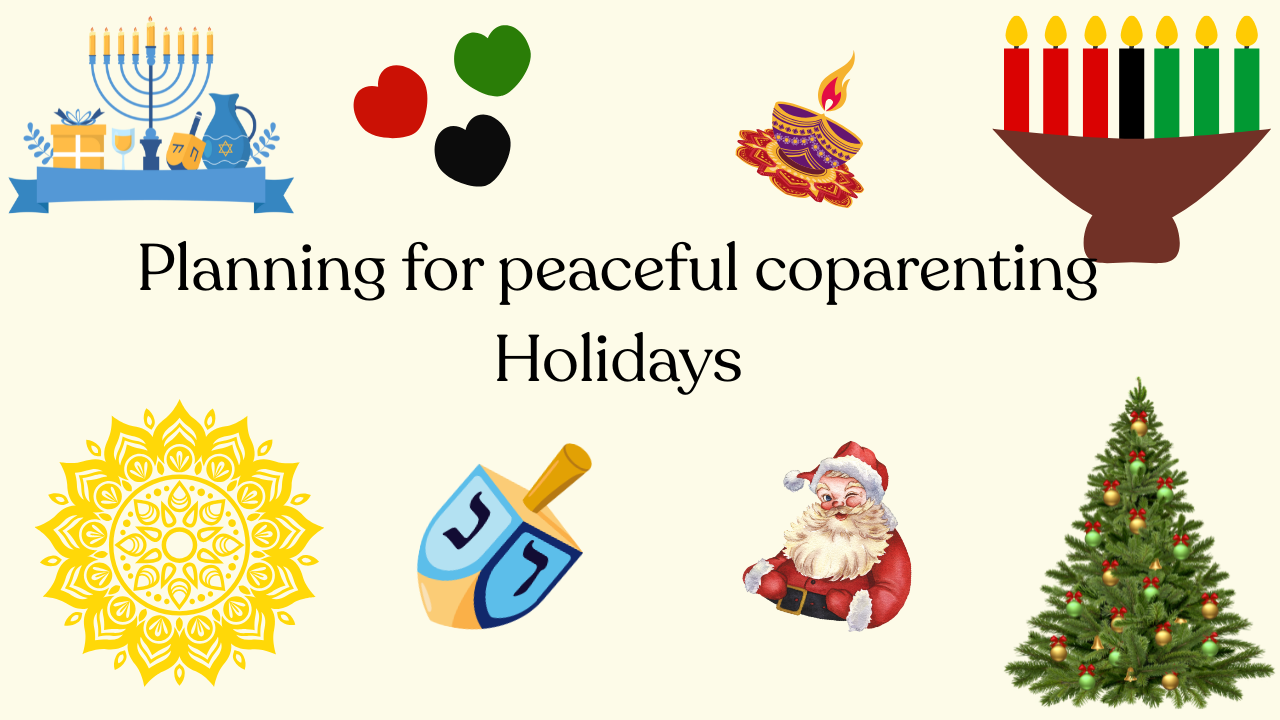How to Plan a Peaceful Holiday Season When You're Coparenting
Oct 30, 2025
The holidays are supposed to be magical.
But when you're coparenting, they can feel more like a minefield.
Custody schedules. Family traditions. Gift coordination. Travel plans. And a dozen conversations with your ex that you'd rather not have.
After two decades of coaching parents through holiday coparenting, I've seen the same pattern over and over:
The families who plan early have peaceful holidays. The ones who wait end up in conflict, confusion, and courtrooms.
The good news? It doesn't have to be that way.
With the right approach, you can create a holiday season that's centered on your child's joy—not your stress.
Why Early Holiday Planning Matters
Here's what happens when you wait until the last minute:
-
Your co-parent makes plans without you, and suddenly you're scrambling
-
Your child feels caught in the middle, unsure where they'll be or what to expect
-
Small disagreements escalate into big conflicts
-
You miss out on important family events or traditions
-
The stress bleeds into every interaction with your ex
But when you start planning in early October?
Everything shifts.
You have time to communicate clearly. Your child gets clarity and security. And you protect your peace instead of reacting to chaos.
The Child-First Holiday Mindset
Before you touch a calendar or send a single text to your co-parent, pause and ask yourself:
-
What do my kids need this holiday season?
-
What memories do I want them to have?
-
How can I protect their relationship with both parents during this time?
When you anchor in these questions, the logistics get easier. The ego takes a back seat. And your kids get the gift that matters most: peace.
Your Holiday-by-Holiday Planning Timeline
🎃 Halloween (October 31)
Start planning: Early October
Key conversations with your co-parent:
-
Who has the kids on Halloween night?
-
Will you split trick-or-treating time or alternate years?
-
Costume coordination—who's buying, who's helping with prep?
-
Any school or community events that require both parents' awareness?
Ask your kids:
-
"What do you want to be for Halloween?"
-
"Do you want to trick-or-treat with friends, or would you like us to come with you?"
-
"Is there a neighborhood or area you really want to go to?"
🦃 Thanksgiving
Start planning: Early October
Key conversations with your co-parent:
-
Custody schedule—alternate years, split the day, or extended weekend trade?
-
Travel plans if either parent is going out of town
-
What time does custody exchange happen if you're splitting the day?
-
Any extended family gatherings your child should attend?
Ask your kids:
-
"What's your favorite part of Thanksgiving?"
-
"Is there a family member you really want to see this year?"
-
"How do you feel about the schedule we're planning?"
Child-First tip: Thanksgiving is about gratitude and connection. If your child is anxious about missing one parent, consider a quick call or video chat during the day. Don't make them choose sides or feel guilty about being happy at the other parent's house.
🎄 December Holidays
Start planning: Late October/Early November
Key conversations with your co-parent:
-
Custody schedule—Christmas Eve vs. Christmas Day, alternating years, or split?
-
Hanukkah nights—how will you share the eight nights?
-
Gift coordination—agree on budget, avoid duplicate gifts, discuss big-ticket items
-
Extended family visits and travel
-
School break schedule (often 1-2 weeks off)
-
New Year's Eve plans
Ask your kids:
-
"What traditions are most important to you this year?"
-
"Is there anything new you'd like to try this holiday season?"
-
"How do you feel about the time you'll spend with each of us?"
-
"What's on your wish list?" (Then share with co-parent to avoid duplicates)
Scripts for Holiday Planning Conversations
Opening the Conversation with Your Co-Parent
"Hi [Name], the holidays are coming up and I'd like to start planning so we're both on the same page and the kids have clarity. Can we set up a time this week to work through the schedule?"
When You Disagree on the Schedule
"I hear that you'd prefer [option]. I was thinking [option]. What if we focus on what [child's name] needs most? Can we ask them what would feel best, or try alternating this year and next?"
Coordinating Gifts
"I know [child's name] really wants [item]. I'm planning to get [gift]. Are you thinking of getting [item]? I want to make sure we're not duplicating and that they feel equally loved at both homes."
When Your Co-Parent Won't Communicate
"I'd like to coordinate the holiday schedule and gifts to make things easier for [child's name]. I'm planning to have them [dates/times] and will be getting [general gift category]. If I don't hear back by [date], I'll move forward with this plan and keep you updated."
Common Holiday Pitfalls to Avoid
❌ Waiting until the last minute to discuss plans❌ Using your child as a messenger❌ Making your child choose between parents or traditions❌ Competing with gifts to prove you're the better parent❌ Bad-mouthing the other parent's plans or traditions❌ Overscheduling your child to the point of exhaustion❌ Ignoring your child's preferences because you're focused on "fairness"❌ Assuming your child is fine without checking in on their feelings
When Conflict Arises: The Pause-and-Anchor Practice
The holidays will test you. Your co-parent will say or do something that triggers you.
Here's what to do:
1. Pause. Don't respond immediately. Take three deep breaths.
2. Anchor. Ask yourself: "What do my kids need right now? What kind of parent do I want to be in this moment?"
3. Respond from your values. Use CLEAR communication (Concise, Listener-ready, Essential, Appropriate, Relevant). Keep it child-focused.
Example:
Instead of: "You're being completely unreasonable about Christmas!"
Try: "I want to make sure [child's name] has a clear plan for Christmas. Can we focus on what works best for them?"
This Year Can Be Different
The holidays don't have to be a battleground.
They can be imperfect and still peaceful. They can be hard and still meaningful.
When you plan early, communicate clearly, and keep your child at the center of every decision, you're giving them the gift that matters most: the freedom to enjoy the holidays without fear, guilt, or divided loyalty.
You've got this.
Ready for More Support?
If you're feeling overwhelmed by the idea of navigating the holidays with your co-parent, I've created a complete Child-First Holiday Planning Guide to help you through every step.
Download your free Holiday Planning Guide here
Inside, you'll find:
-
A detailed holiday-by-holiday timeline
-
Scripts for tough conversations with your co-parent
-
Age-specific questions to ask your kids
-
A complete planning checklist
-
The Pause-and-Anchor Practice for managing conflict
And if you need personalized support? Book a complimentary consultation and let's create a plan that protects your peace and your child's joy this holiday season.
Rita Morris, M.Ed., LMHC, CPC, is a coparent coach with two decades of experience helping families navigate the challenges of coparenting. She specializes in child-focused communication strategies and peaceful conflict resolution.
Cooperative Coparenting Is Possible!
Get started today by downloading my Coparent Communication Essentials.


